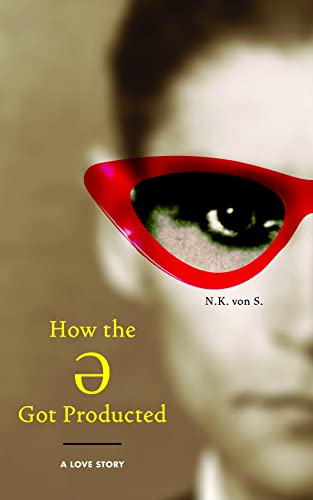
How the Ə Got Producted: A Love Story received a 4+ star review, making it an IndieReader Approved title.
Following find an interview with author N.K. von S.
What is the name of the book and when was it published?
How the Ə Got Producted: A Love Story, published January 1, 2022.
What’s the book’s first line?
“The first time I heard of the Ə I was sitting.”
What’s the book about? Give us the “pitch”.
It’s about a feminist anti-hero who fails upward, boarding the Washington DC revolving door as a prominent medtech lobbyist, spit out as a high-level technocrat in the Bureau of Biomedicaltechnology. The novel charts N.’s story from the trauma that upends her bohemian New York City childhood to her one-sided love affair with a seductive but damaged young attorney to her professional rise and fall and rise. The unifying thread is N.’s yearning for connection, which the Ə—a blockbuster technology stalled in the Bureau’s labyrinthine approval processes—promises to fulfill. N.’s determination to unleash the Ə into the hands of the American consumer forces a confrontation with her old lover, who is now a crusading anti-technology presidential candidate, and clears the way for the Ə to change the world. For better or for worse.
It’s also about language, technology, and sex, I guess.
What inspired you to write the book? A particular person? An event?
The iPhone. Imagine meeting someone who has never seen an iPhone, and they ask you, what does that thing do? How do you answer that? You could name thirty apps off the top of your head, but that doesn’t really get at it I don’t think. One answer is that it makes you feel connected. That was my idea for the Ə, something that’s ubiquitous and that you can’t imagine living without. But it’s hard to pin down what it does.
What’s the main reason someone should really read this book?
Fiction exists for its own reasons. I don’t think it has to make a point. Still, when I connect with a work of fiction I feel less alone in the world. Maybe that’s one small measure of success for satire, serving as a sanity check for people who can’t jibe with popular views about the satire’s target. So I hope my book scratches an itch for readers bewildered by the breathless technology fandom—whether it’s consumer gadgetry, medical tech, or things like crypto—of the past twenty or so years. At the same time, I hope some readers just find it fun.
What’s the most distinctive thing about the main character? Who-real or fictional-would you say the character reminds you of?
Her lack of self-awareness. I remember seeing the movie To Die For and thinking the Nicole Kidman character was very plausible and very disturbing. I think of N. as a well-meaning version of that character. She is self-absorbed, ambitious in her way, and has the same uncritical faith in technology that the To Die For character has in the media. N. also has a rather high self-regard and is indignant towards anyone who challenges her. So that’s my answer. A cross between Suzanne Stone in To Die For and Ignatius J. Reilly in A Confederacy of Dunces.
When did you first decide to become an author?
In sixth grade I wrote an angry tween novella. In my mid-twenties I wrote a horror novel where the monster was marriage. After that I published a few short stories and around the time self-publishing was becoming easier I self-published a novel under a different name. Right now, I have two half-finished books on my computer, a family novel and a psychological thriller. I never decided to do anything. I’ve just always had a lot of stuff I needed to get out of me before I could get on with my life.
What do you do for work when you’re not writing?
I am currently a solo practitioner with a little law practice. I was a partner with a big fancy law firm and, for many years, a faceless bureaucrat with a federal agency.
What’s the best and the hardest part of being an indie?
Having control over your work is a wonderful thing. One thing I love is being the one to decide what my book looks like. The artist I worked with came up with a cover that is arresting and irreverent and just right for my book. A lot of book covers look like they were produced by a marketing algorithm. It would bum me out a lot to have to stick my book behind something like that.
On the other hand, I’d happily turn over responsibility for developing a marketing plan and the like. I wrote an odd novel about a technology named for a phoneme. You can’t easily search the title because it contains a special character. I used a pen name that is also unsearchable because it’s just a bunch of consonants. And I won’t venture onto social media because it scares me. So I might not be very good at the marketing side of things.
Which book do you wish you could have written?
Too many to name. There are novels that are written very precisely about a very particular experience. Yet when you turn the last page it’s as though you’ve watched the universe expand before your eyes, so it feels like a magic trick. Examples that come to mind are Eileen by Ottessa Moshfegh, Remainder by Tom McCarthy, and The Dry Heart by Natalia Ginzberg. It is a very unusual gift that I deeply admire.
